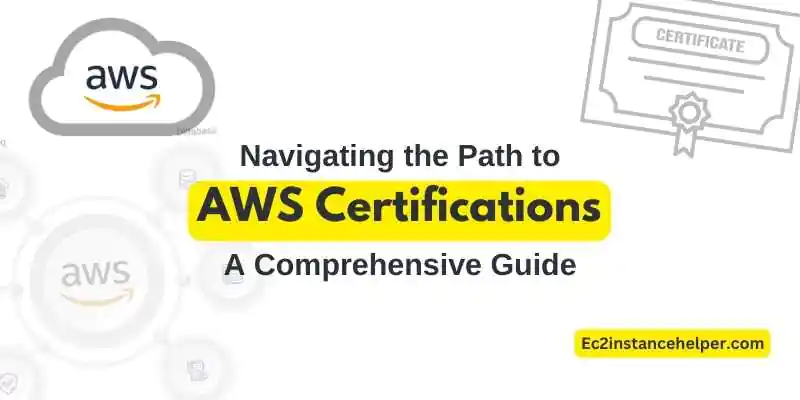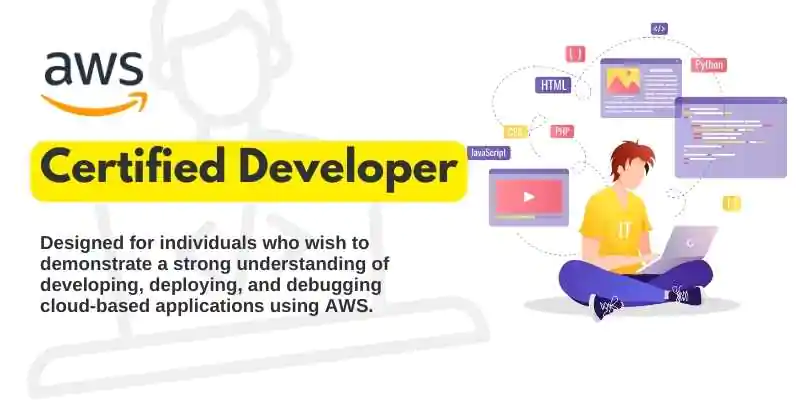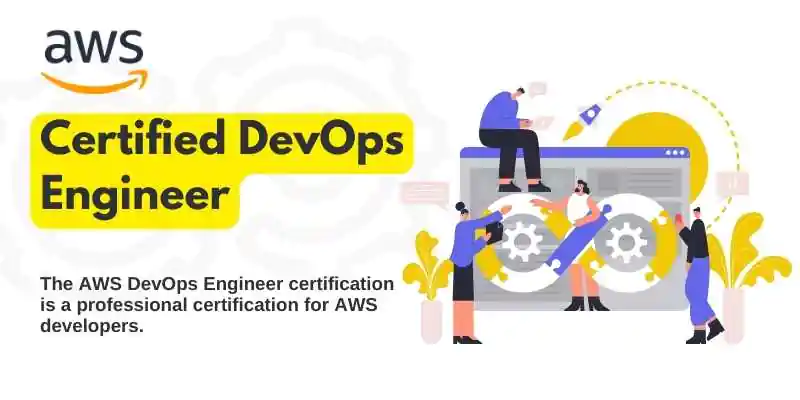Embarking on the journey to obtain an AWS certification can be a transformative step in your career, opening up new doors of opportunity and demonstrating your expertise in cloud computing. However, with a wide range of certifications available, each catering to specific roles and skill sets, navigating the path to AWS certifications can seem overwhelming. Fear not! In this comprehensive guide, we will provide you with a clear roadmap to successfully navigate the path to AWS certifications. Whether you’re a beginner exploring cloud computing or an experienced professional looking to validate your skills, this guide will equip you with the knowledge, resources, and strategies needed to achieve your certification goals. From understanding the different certification levels and domains to preparing effectively for exams, we will cover it all.
AWS Cloud services provide a great path toward expertise in cloud infrastructure. Whether you’re looking to earn your first certification or upgrade existing credentials, this article will provide valuable insights and tips on how to find success on your path to AWS certification.
The AWS services offer a wide range of opportunities from infrastructure-as-a-service, platform-as-a-service, to software-as-a-service. With AWS certification, you can demonstrate your skills in managing and operating complex enterprise environments using various AWS services.
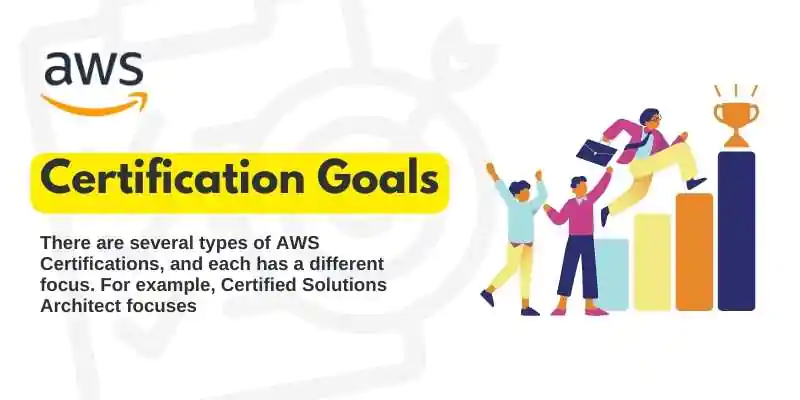
AWS Certification Goals
There are several types of AWS Certifications, and each has a different focus. For example, Certified Solutions Architect focuses on designing applications ats system level in accordance with business requirements while Certified Developer focuses on building core application components such as API Gateway, DynamoDB and S3. Here’s a list of all the available certifications:
- AWS Certified Cloud Practitioner
- AWS Certified Developer – Associate
- AWS Certified SysOps Administrator – Associate
- AWS Certified Solutions Architect – Associate, Professional
- AWS Certified DevOps Engineer – Professional
- AWS Certified Advanced Networking – Specialty
- AWS Certified Security – Specialty
- AWS Certified Machine Learning – Specialty
- AWS Certified Database – Specialty
- AWS Certified Data Analytics – Specialty
- AWS Certified SAP on AWS – Specialty
AWS Certification Free Tutorials and Resources
- This is one of the core resources for preparing for AWS solution architect Certification exams.
- This is the official exam guide from Amazon.
- This fantastic blog mentions most of the starter resource pointers you would need.
- This training is intended for customers and system administrators alike
- This one is the official AWS sample exam paper.
- This one is an Udemy Free resource.
Obviously, this is just a start, web is quite full of amazing and useful free training tools which require a bit more digging.
- We also highly recommend that you set up your AWS account and start testing stuff on it directly as much as possible. There is really no alternative to actual experience.
AWS Certification Requirement and Prerequisites
To become a certified AWS professional, there aren’t any strict requirements as such but only recommendations. We shall mention some of the important ones.
- Children between 13 and 17 need parental consent.
- AWS of course big player for equal opportunity and non-discrimination.
- Good Understanding of IT infrastructure and best practices.
- Minimum 6 months to and year of experience using AWS services in a preferably professional setting.
- As you progress t associate and professional level exams, the minimum experience recommended is 1 year with a solid understanding of at least one programming language.
- With specialty exams, the level of proficiency increases considerably which will eventually come with time, after you have achieved passing associate/professional level exams.
AWS Certification Exam Costing
This is only the entrance fee for exams and does not include any extras.
Foundation or Basic = 100 USD
Associate = 150 USD
Professional = 300 USD
Specialty = 300 USD
.
What is AWS Cloud Practitioner
- AWS Cloud Platform fundamentals.
- Understanding the AWS platform.
- Identifying AWS services for use cases.
- Fundamentals of Building secure and reliable systems.
- Targeted at People with no prior experience in IT.
- Sales or Marketing people looking to build knowledge in AWS cloud fundamentals which can facilitate communication with technical staff and/or customers.
AWS Certified Developer
Designed for individuals who wish to demonstrate a strong understanding of developing, deploying, and debugging cloud-based applications using AWS. This certification validates an individual’s ability to:
- Design, develop, and deploy cloud-based solutions using AWS services.
- Develop secure and reliable applications on the AWS platform.
- Utilize best practices for building scalable solutions.
- Proficiency in AWS CLI, APIs, and SDKs.
- Proficiency to write and debug code modules.
Recommended AWS Certified Developer Prerequisites
- In-depth knowledge of at least one programming language
- 1 year’s worth of experience with AWS services
- 1 to 2 years of IT Experience
AWS Certified Solutions Architect
As an AWS Certified Solutions Architect, you will be able to design, architect, and build highly available and scalable cloud-based applications using AWS. You will have the knowledge
- Experience and skills in a wide range of AWS services
- Develop optimized and well-architected overall solutions which are also cost-effective
- Build solutions that leverage AWS services such as Amazon DynamoDB, Amazon EC2, Amazon S3, Amazon RDS (Relational Database Service), and more.
- AWS Certified Solutions Architects are expected to possess a fundamental understanding of what constitutes an effective/best solution for a given problem, using AWS services.
- They should be able to design complex solutions that scale easily in response to changes in demand or capacity needs.
Recommended AWS Certified Solution Architect Prerequisites
- Strong on-site IT experience
- Strong experience in AWS services
- Experience with any other cloud services
AWS Certified SysOps Administrator
The AWS Certified SysOps Administrator certification is a professional credential that proves
- Capacity to deploy, and manage active workloads on a day-to-day basis
- To administer and troubleshoot EC2 instances, RDS. DB Instances, ELB load balancers, and other services
- Strong ability to work with Linux/Windows operating systems.
Recommended AWS Certified SysOps Administrator Prerequisites
- Already experienced as a system manager and administrator
- Experience with AWS services
- IT Experience and working with cloud services generally.
AWS Certified DevOps Engineer
The AWS DevOps Engineer certification is a professional certification for AWS developers.
- Validates your ability to design, plan and implement an automated infrastructure that meets requirements for performance, availability and scalability.
- Capacity to design highly scalable and fault-tolerant system
- Strong experience with AWS services in general
- Ability to configure and deploy AWS solutions using automated scripts and CLI
AWS Certified DevOps Engineer Prerequisites
- In-depth experience in at least one high-level programming language
- Experience with automation and automated infrastructures
- Experience in continuous integration and continuous delivery ( CI/CD )
- Experience in deploying, monitoring, and logic different matrices
AWS Certified Big Data – Specialty
This one is a professional certification for data management professionals who want to use the AWS cloud to analyze and process large volumes of data. The exam is designed for people with experience in big data technologies who want to expand their learning to use them in an AWS environment
AWS Certified Advanced Networking – Specialty
It is an advanced-level certification that validates a candidate’s ability to design and implement complex networking solutions on the Amazon Web Services platform. This certification requires a deep understanding of AWS networking concepts, such as virtual private clouds (VPCs), routing, security groups, and network access control lists (ACLs).
AWS Certified Security – Specialty
The AWS Certified Security – Specialty certification validates the candidate’s ability to design, engineer, and maintain secure, scalable, and cost-efficient AWS infrastructure with
- Security fundamentals and best practices.
- Understanding of how security works in the cloud.
- AWS credentials management including IAM service accounts, access keys, and multi-factor authentication.
AWS Certified Machine Learning – Specialty
The AWS Certified Machine Learning certification is designed for professionals who want to acquire skills in machine learning and apply them on the AWS cloud. This certification is acknowledged in the industry as it shows you have the skills needed to architect and analyze machine learning models, use deep learning frameworks such as TensorFlow, and deploy production-grade applications using distributed systems such as Apache Spark and Apache Hadoop on target AWS infrastructure.
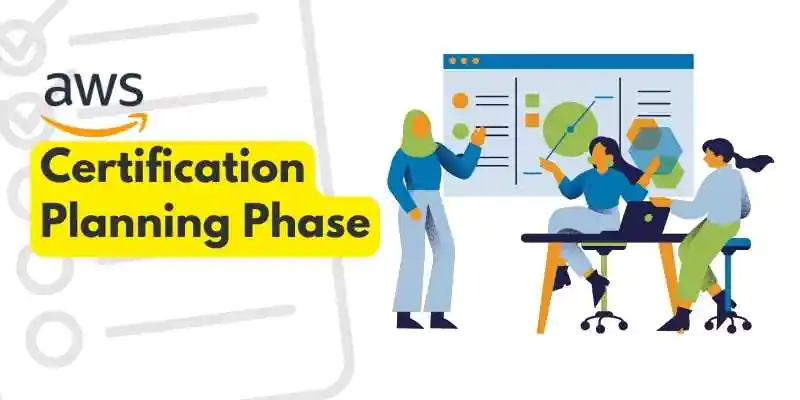
AWS certification – planning phase
Create a Study Timeline and Set Milestones
Make sure to plan out a study timeline that allows you enough time to thoroughly prepare for AWS Certification. Create milestones throughout the timeline so that you can actively measure your progress on the path to certification.
Consider Practicing with Mock Exams or Labs
Practicing the topics and technologies is a great way to gain confidence in preparation for your certification exam. Consider taking mock exams or labs to get hands-on experience with the real AWS technology. Time management is essential.
Leverage Study Resources, such as Books and Videos
AWS certifications come with an overwhelming volume of material, but it is important to have exam-specific resources that can provide guidance and instruction throughout your preparation journey. Books like “AWS Certified Solutions Architect” or “AWS Certified Solutions Architect Professional Training Notes” available from Amazon, are great because they offer hundreds of practice questions, helpful tips, and advice for exam day. Additionally, there is an array of YouTube channels dedicated to providing instruction toward certain certifications.
FAQ – AWS Certifications
How achieving AWS certifications can help an individual?
AWS certifications offer several advantages to individuals and organizations in progressing career goals and professional development in many different ways. AWS certifications provide you with confidence in your abilities to design, deploy, and manage AWS infrastructure. They enhance your credibility as an expert in the field, enabling you to tackle complex projects and make informed decisions related to AWS implementations. They are widely recognized and respected in the industry as they validate your expertise and skills in using AWS services, making you stand out among other professionals. Employers often look for certified individuals when hiring for AWS-related roles.
- AWS certifications require passing rigorous exams that test your understanding of AWS services, architectures, and best practices. By preparing for and achieving certification, you validate your knowledge and gain a comprehensive understanding of AWS services and their practical applications.
- Holding an AWS certification can significantly enhance your career prospects. It demonstrates your commitment to continuous learning and professional development. With an AWS certification, you may qualify for new job opportunities, promotions, and salary increases.
- AWS certifications grant you access to a variety of exclusive resources, such as the AWS Certified LinkedIn community, AWS Certified digital badges, and other networking opportunities. These resources can help you connect with other certified professionals, and potential employers, and gain additional insights into AWS services.
- If you work for an AWS Partner Network company, achieving AWS certifications can unlock several benefits. APN partners can attain various partner tiers based on the number of certified individuals within their organization. These tiers provide access to specialized training, AWS marketing support, and eligibility for incentives.
- In a competitive job market, AWS certifications differentiate you from other candidates. Employers often prioritize certified professionals, as they are confident in their abilities to handle AWS infrastructure and deliver efficient solutions.
- AWS certifications require regular recertification to ensure that certified individuals stay up-to-date with the latest AWS services and best practices. This encourages continuous learning and professional growth, enabling you to stay relevant in the rapidly evolving AWS ecosystem.
Which AWS certification is most useful for beginners?
For beginners looking to start their journey with AWS certifications, the AWS Certified Cloud Practitioner is often considered the most useful certification to begin with. The AWS Certified Cloud Practitioner certification is designed to validate a candidate’s overall understanding of AWS Cloud services and the basic architectural principles. It covers a broad range of topics, including AWS core services, security, pricing, and support. This makes it an excellent starting point for beginners, as it provides a solid foundation of knowledge about AWS. The Cloud Practitioner certification is considered to be the entry-level certification in the AWS certification path. It does not require extensive technical experience or in-depth knowledge of AWS services. This makes it more accessible and achievable for beginners who are just starting their cloud journey. The knowledge gained from the Cloud Practitioner certification is applicable across various roles, including technical, non-technical, managerial, and sales positions. It provides a holistic understanding of AWS Cloud concepts and terminology, enabling individuals to communicate effectively with technical teams and stakeholders. It emphasizes the basic principles of cloud computing, the benefits of AWS Cloud adoption, and the ability to differentiate between different AWS service categories. This knowledge is valuable for individuals involved in decision-making processes, such as project managers, business analysts, and executives.
Are AWS certifications costly?
AWS certifications do come with certain costs, but the exact expenses can vary depending on the specific certification and the region in which you take the exam. Each AWS certification exam has an associated fee that you need to pay when registering for the exam. The fees can vary depending on the certification level. Generally, the more advanced and specialized the certification, the higher the exam fee. The AWS Certified Cloud Practitioner exam, being an entry-level certification, typically has a lower cost compared to the professional-level or specialty certifications.
- To effectively prepare for AWS certification exams, you may need study materials, practice exams, and training courses. While there are free resources available, such as AWS documentation and whitepapers, you might choose to invest in paid study guides, online courses, or practice exams to enhance your preparation. The costs for these resources can vary, and it depends on your personal preferences and learning style.
- AWS offers official training courses for each certification. These courses can be beneficial for gaining in-depth knowledge and hands-on experience with AWS services. However, they come with a cost, and the prices can vary based on factors like the delivery format (in-person or online), duration, and the level of the course.
- AWS certifications are valid for a certain period (usually two or three years), after which you need to recertify to maintain your certification status. Recertification involves passing the latest version of the respective exam. It’s important to consider the potential cost of recertification when planning your long-term certification strategy.
It’s worth noting that the investment in AWS certifications can provide significant returns in terms of career advancement, job opportunities, and increased earning potential.
Do AWS certifications require some background expertise or qualifications or criteria?
AWS certifications do not have strict prerequisites in terms of specific degrees or qualifications. However, it is recommended to have some background expertise and practical experience with AWS services to increase your chances of success. Here are some factors to consider: While not mandatory, having hands-on experience with AWS services is highly beneficial for understanding the concepts, architectures, and best practices covered in the certification exams. It is advisable to have practical experience in deploying, managing, and troubleshooting AWS infrastructure and services. A basic understanding of cloud computing concepts, such as virtualization, on-demand provisioning, scalability, and high availability, is advantageous. It helps in comprehending the underlying principles and benefits of AWS Cloud services. In certain cases, higher-level certifications may have prerequisites in the form of other AWS certifications. For example, the AWS Certified Solutions Architect – Professional certification requires candidates to have passed the AWS Certified Solutions Architect – Associate exam beforehand. It’s important to note that AWS certifications are designed for individuals at various stages of their careers, including beginners. The entry-level certifications, such as the AWS Certified Cloud Practitioner, assume little to no prior AWS experience and are intended to establish foundational knowledge. Ultimately, while prior experience and knowledge can be advantageous, AWS certifications are open to individuals with varying backgrounds and qualifications.
